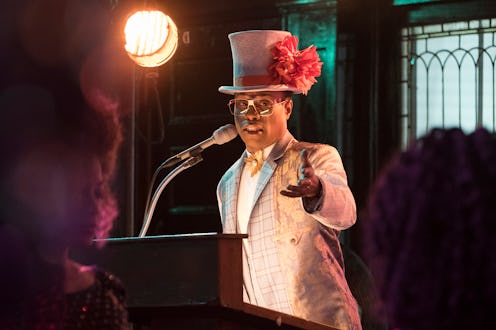Entertainment
Billy Porter Says 'Pose' Season 2 Isn't About "Madonna Bashing" — But It's Complicated

"I want this to be messy," Pose co-creator and executive producer Ryan Murphy tells a group of cast members and extras who are standing too neatly in line on the Bronx set of Pose in early May. He's directing a ball scene that's supposed to take place in a crowded club, but he could also be talking about the main theme of Pose Season 2, which picks up in 1990, three years after the Season 1 finale. Madonna's "Vogue" has hit the airwaves, and the main characters are grappling with the messy complexities of having their subculture go mainstream.
Is it good or bad that a bunch of mainly straight, white, and middle class people outside of New York City are introduced to ball culture by a relative outsider like Madonna? And what does it mean for characters like Blanca, Damon, and Angel to want to maybe let these new people into their world and maybe make a buck off these newbies? What does it mean to want recognition from a society that wants nothing to do with you except use your dance moves and your slang? It's a messy and important conversation to have, especially in 2019, when popular artists still rip off ball, hip hop, and drag culture, among others — all the creations of disenfranchised communities.
Co-creator and executive producer Steven Canals tells reporters on the same FX set visit that he had always planned to eventually get to this point in ball culture's history. "This season is absolutely an exploration of what happens when a subculture then reaches mainstream culture," he says. Exploring what the implications of that shift are for the characters will be a big part of the season. "It feels like it would have been false for us to not lean into [the appropriation that came along with Madonna’s “Vogue”] as a theme, or to explore what it means for ballroom to suddenly become mainstream," he says.
Murphy says Season 2 is mostly about what it feels like to be part of a disenfranchised community that gets quickly swept up in a trend and then dumped unceremoniously. The director cites Willy Ninja as an example. "[He] actually had a moment where he thought he was going to become a mainstream star, and was flown to Paris and was feted and treated royally like he should have been, and then overnight came New Kids on the Block, which was the next trend. The idea is that every generation has that inflection moment when you think you’re in, and then you’re not in."
The new, albeit limited, visibility also presents some opportunities for the characters on the show, much like it did in real life. Damon (Ryan Jamaal Swain), for example, starts teaching a vogueing class, Angel (Indya Moore) manages to get a modeling contract, and M.J. Rodriguez's Blanca, ever the optimist, sees nothing but dreams coming true for herself and her other kids. Star Billy Porter breaks the season's theme down simply. "This is not about Madonna bashing, I want to make that clear. And you’ll see it in the work — we really, really honor her and honor her contribution to this story," Porter says. "She’s a part of the pieces of why we’re here." (Murphy adds that Madonna "immediately" gave the series the rights to the song, which plays throughout Season 2.)
Porter continues, "I feel like we have to honor the truth that Madonna has always been an LGBTQ ally in ways that not many were doing before she came along and she was a leader in that front. I have to say that." He adds, "So while there are things about appropriation that are problematic, for me it can’t go unsaid that she was totally present for us through the darkest of times, so it’s a really interesting story to tell, because it did amazing things for us."
For co-producer, writer, and director Janet Mock, having these layered conversations about appropriation on the show is a healing process. "People judge you for making a way out of no way, which is what our characters do and why we have this particular space and why this show speaks to so many — well, actually not that many people, but the show means a lot to a few people. Especially the few people who are never getting the chance to see themselves," she says.
Mock might be too modest when it comes to calculating who is watching and appreciating Pose, especially now that Season 1 is on Netflix and can be enjoyed by even more people — even those who can't afford cable. If anything, the theme of subcultures going mainstream in Season 2 is a little meta, given that the series has introduced even more newbies to the ballroom scene.
"On the heels of Pose, so many more folks are aware of ballroom culture and vogue is in vogue again," Canals adds. That may be so, but at least Canals, Murphy, Brad Falchuk, Mock, Our Lady J, and every cast and crew member are the gatekeepers of their own stories, messy or otherwise.
This article was originally published on